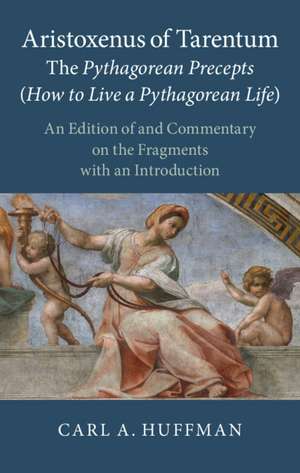Aristoxenus of Tarentum: The Pythagorean Precepts (How to Live a Pythagorean Life): An Edition of and Commentary on the Fragments with an Introduction
Carl A. Huffmanen Limba Engleză Hardback – 30 oct 2019
Preț: 955.28 lei
Preț vechi: 1240.63 lei
-23% Nou
Puncte Express: 1433
Preț estimativ în valută:
182.88€ • 188.08$ • 151.72£
182.88€ • 188.08$ • 151.72£
Carte tipărită la comandă
Livrare economică 13-19 februarie
Preluare comenzi: 021 569.72.76
Specificații
ISBN-13: 9781108425315
ISBN-10: 1108425313
Pagini: 646
Dimensiuni: 144 x 223 x 37 mm
Greutate: 0.86 kg
Editura: Cambridge University Press
Colecția Cambridge University Press
Locul publicării:Cambridge, United Kingdom
ISBN-10: 1108425313
Pagini: 646
Dimensiuni: 144 x 223 x 37 mm
Greutate: 0.86 kg
Editura: Cambridge University Press
Colecția Cambridge University Press
Locul publicării:Cambridge, United Kingdom
Cuprins
Part I. Introduction: 1. Evidence for the work: the excerpts preserved in Stobaeus; 2. Title and nature of the work; 3. Format and style of the work; 4. Fragments of the Pythagorean Precepts preserved in Iamblichus' On the Pythagorean Way of Life; 5. A comparison of Stobaeus' and Iamblichus' evidence for the Pythagorean Precepts; 6. Relationship of the Pythagorean Precepts to Aristoxenus' other works on the Pythagoreans; 7. The influence of the Pythagorean Precepts on the later Pythagorean tradition; 8. History of scholarship on the Pythagorean Precepts; 9. The standard view of the Pythagorean Precepts; 10. The ethical system of the Pythagorean Precepts; Part II. Fragments with Translation and Commentary: 11. The Pythagorean Precepts: a reconstructed text in English; 12. Fragment 1: obedience to parents and the laws (fr. 34 Wehrli = Stobaeus, 4.25.45); 13. Fragment 2: the importance of order and supervision for every age of life (fr. 35 Wehrli = Stobaeus, 4.1.49); 14. Fragment 3: desire (fr. 37 Wehrli = Stobaeus, 3.10.66); 15. Fragment 4: the generation of children (fr. 39 Wehrli = Stobaeus, 4.37.4); 16. Fragment 5: the love of what is beautiful and fine (fr. 40 Wehrli = Stobaeus, 3.1.101); 17. Fragment 6: learning must be willing (fr. 36 Wehrli = Stobaeus, 2.31.119); 18. Fragment 7: luck (fr. 41 Wehrli = Stobaeus, 1.6.18); 19. Fragment 8: human nature is prone to excess and needs the supervision of the gods, parents and laws (fr. 33 Wehrli, Iamblichus, VP 174-6); 20. Fragment 9: opinion, the training of children and young people, pleasure, desire, diet, and the generation of children (fr. 38 Wehrli, Iamblichus, VP 200-13); 21. Fragment 10: the appropriate and the inappropriate in human interaction. On starting points and rulers (Iamblichus, VP 180-3); 22. Fragment 11: friendship (Iamblichus, VP 101-2, 230-3); Part III. Appendices: 23. Subsidiary Precepts 1: avoid crowds in the morning, and 2: avoid hunting (Iamblichus, VP 96-100); 24. Subsidiary Precept 3: memory (Iamblichus, VP 164); 25. Subsidiary Precept 4: all sex is harmful (Diodorus Siculus, Library of History 10.9.3); 26. Stobaeus, Eclogae 3.1.71: divination, medicine, and music.
Recenzii
'… this publication is therefore certainly a exegetical monument essential to all those who are interested in ancient or Aristoxenian Pythagoreanism.' Laurent Claive, Resenas Reviews
Descriere
The first detailed study of The Pythagorean Precepts, which present the Pythagorean way of life praised by Plato.
